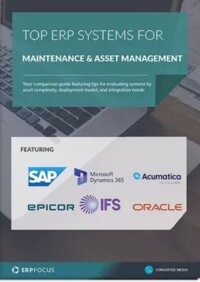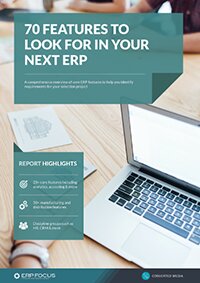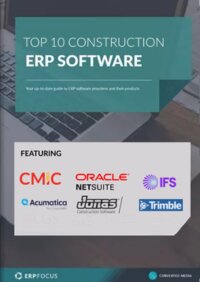A complete introduction to using ERP for fleet management
Most of us probably don’t think of ERP as a fleet management tool but maybe we should reconsider. Even the most basic ERP systems use resources that we usually associate with production equipment and tools.
For example, a tractor is just another resource, isn’t it? The same ERP software that helps us schedule preventive maintenance around our production needs can also track when it’s time to change the oil in a truck. Additionally, it can monitor tire and battery life. The concepts are similar enough that the same ERP system used for production can also be applied to fleet management.
Scheduling
We use ERP software to schedule production personnel, such as welders and material movers. Similarly, it can be used to schedule drivers. By tracking time behind the wheel, the system ensures that required breaks are taken and that regulatory requirements are met.
Your fleet might include trailers used to store overflow materials in the parking lot. Your ERP inventory module, which already manages shelf and bin locations, could also assign one of those locations to trailer #25. This way, you can easily find the parts you moved outdoors last summer.
CMMS integration for fleet management
While basic ERP systems offer substantial benefits for fleet management, incorporating a CMMS (Computerized Maintenance Management System) can take it to the next level. Open-source ERP systems like Odoo, Adempiere, and Open Bravo offer integrated fleet management tools that link directly to all the other ERP modules in the same set of databases. On the higher end of the spectrum, SAP does as well and the ERP you already use might have similar offerings.
CMMS manages fleet maintenance, from routine oil changes to complex repairs. ERP integration provides detailed maintenance histories, real-time scheduling, and fleet-specific parts inventory management.
How CMMS enhances fleet management
A CMMS enhances fleet management by providing specialized tools for tracking and managing maintenance needs. When integrated with an ERP system, it automates work orders, schedules preventive maintenance, and helps manage parts inventory, leading to reduced downtime and extended vehicle lifespans.
Increased revenue
ERP tools optimized for fleet management can significantly increase revenue. Advanced tools enable you to plan loads and vehicle placement for efficient unloading at sequential customer docks. Route optimization maximizes driver and truck time on the road while ensuring compliance with regulations. Additionally, scheduling backhauls for other businesses allows your fleet to generate income on return trips instead of returning empty.
By integrating CMMS, the system can automatically schedule maintenance during off-peak hours, reducing downtime and ensuring your fleet remains operational.
Enhanced cost management
Another major benefit of integrating fleet management with ERP is improved cost control. ERP systems can track and record fleet operating expenses, offering insights into trends by individual vehicle or across the entire fleet. This data is invaluable when evaluating bids from third-party fleet providers, enabling informed decisions based on actual cost comparisons.
CMMS integration further enhances cost management by providing detailed reports on maintenance expenses, labor costs, and parts usage. This allows you to quickly identify when a vehicle becomes costlier to maintain, facilitating strategic decisions about repairs, replacements, or retirement.
Driver and vehicle monitoring
Drivers play a crucial role in fleet operations, and their performance significantly impacts overall efficiency. ERP systems can track driver information, including licenses, certifications, and accident histories, ensuring compliance with regulatory requirements. CMMS complements this by monitoring vehicle health and maintenance needs, ensuring each vehicle remains safe and reliable.
Whether you manage a small fleet of two vehicles or a large fleet of 200, the combination of ERP and CMMS provides comprehensive tools to monitor and optimize fleet performance. This integrated approach improves operational efficiency, boosts revenue, and reduces costs, making it a valuable investment for any business.
Free white paper

7 steps to selecting distribution ERP
Get expert advice on distribution ERP selection and requirements analysis

Featured white papers
-

Top ERP Software for Maintenance & Asset Management
Compare ERP systems with CMMS and EAM capabilities to manage your assets smarter
Download -

70 features to look for in your next ERP
A comprehensive guide to help you identify requirements for your ERP selection
Download -

Top 10 Distribution Software Comparison
Compare the best distribution ERP systems available today
Download
Related articles
-

Distribution ERP vs WMS: which suits your needs better?
Distribution ERP vs WMS: be clear on the differences with this guide
-

Secret KPI: Why Your ERP Implementation Team Matters More Than Software
Learn how Godlan ensures successful ERP implementation for manufacturers with proven strategies &...
-

ERP for Food Distributors: Key Functionality
In a modern world where products are tailored to consumers, why should ERP for food distributors ...

